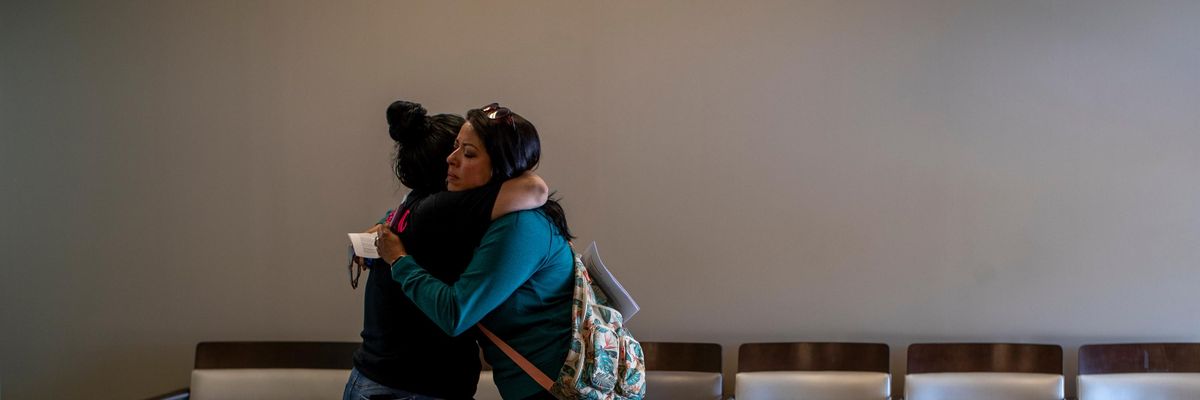Less than a week after the U.S. Supreme Court overturned Roe v. Wade, women across the United States are facing the painful chaos and confusion of a new reality in which they are being forced to continue unwanted pregnancies as clinics end abortion services and struggle to help patients get the care they need.
The court's ruling last Friday immediately triggered abortion bans in nine states that are home to 16 million women of reproductive age. Lower courts have blocked the bans for now in two of them, Louisiana and Utah, but several more states are expected to impose bans soon.
Other states including Texas and Ohio have six-week abortion bans in place--a restriction that effectively bans the procedure for many women, as pregnancy often only becomes apparent past the six-week mark.
A six-week ban went into effect in Tennessee Tuesday, forcing abortion providers to turn away women who have now also lost access to abortion in five of the Tennessee's border states.
None of the state's abortion providers are "less than 180 miles away from existing clinics," Anita Wadhwani of Tennessee Lookout reported as advocates warning of a "looming health crisis" as more residents are forced to carry unwanted pregnancies to term.
"This is just the beginning," said Rabia Muqaddam, senior staff attorney at the Center for Reproductive Rights. "We will continue to see many, many states ban abortion, creating huge abortion deserts in parts of this country resulting in serious harm to people and their families."
Clinic workers across the country have spent recent days telling patients that their procedures have been canceled--a "heart-wrenching" task, Planned Parenthood of Missouri employee Angela Huntington told the Associated Press Wednesday--and are working to help many get care by crossing state lines if it's financially feasible.
"We will continue to see many, many states ban abortion, creating huge abortion deserts in parts of this country resulting in serious harm to people and their families."
Huntington has been working to move people's appointments to facilities in Kansas, Illinois, and Colorado, offering gas cards to patients who can't afford both travel and their medical care.
Dr. Jeanne Corwin, who provides abortions in Dayton, Ohio, worked to make sure a patient who needs chemotherapy for advanced skin cancer is able to terminate her pregnancy, sending her to Indiana, where the procedure is banned after 14 weeks.
Women in Ohio who are in their first trimester of an unwanted pregnancy may soon have to find other states to travel to, however, as the Indiana Legislature is expected to take up potential abortion bans on July 6.
Undocumented immigrants, fearing raids on public transportation and in many cases lacking documents needed to board flights, are "simply not able to go anywhere to get this care," Lupe Rodriguez, executive director of the National Latina Institute for Reproductive Justice, told the AP.
Demand has surged at organizations that provide abortion pills, estimated to be used in more than half of U.S. abortions. According to the New York Times, Just the Pill, a nonprofit organization which helps patients obtain mifepristone and misoprostol, fielded nearly 100 appointment requests after last week's ruling. That was about four times its usual demand.
At least 19 states have laws banning the use of telemedicine to prescribe the pills, and Republican leaders in states including North Dakota and Texas are cracking down on the ability to send mifepristone and misoprostol through the mail.
The Times produced a video titled "This Is What a Post-Roe Abortion Looks Like," narrated by a 27-year-old woman in Texas who had to have a medication abortion.
"First I had to buy a virtual mailbox in a state where abortion is legal," she said. "The pills were shipped to my virtual mailbox, forwarded to my Texas address and then miraculously, there they were in my hands. I got the pills just in time. I was 12 weeks pregnant."
The narrator experienced pain during the medication abortion, but was afraid to go to the hospital for fear that she would be reported to law enforcement.
"Self-managed abortion is not a substitute for having full reproductive rights," she said.
Retailers reported that demand has surged for emergency contraception, also known by the brand names Option 2 and Plan B. Online retail giant Amazon toldThe Guardian that it was placing a temporary limit of three packages of the pill per week, and Walmart said customers are being limited to four or six units of the morning-after pill for delivery orders through the end of the month.
Bedrati Choudhury of New York told The Guardian that she was stockpiling emergency contraceptives in case she or one of her friends needs it, particularly those who don't have health insurance coverage for birth control.
"I have been there--paying for birth control and I know they'd rather pay rent than put money into buying birth control pills," Choudhury said.
States that are protecting or expanding access to abortion care are seeing influxes of patients from out of state, making it likely that in-state patients may have a harder time getting appointments for time-sensitive abortion procedures.
The Supreme Court decision "affects everybody in the country," Susan Frietsche of the Women's Law Project told the AP. "Whereas yesterday, Pennsylvania providers were basically able to find appointment times for people who need to be seen, that is not going to be the case soon."
